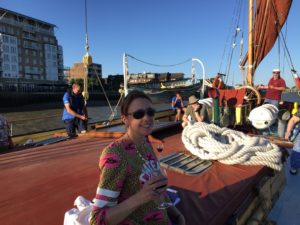 Last Saturday I took a two-hour plodding cruise that went from Greenwich to central London. It was an evening of light winds, little chop, and easy conversation as we passed buildings of every variety that clustered the banks of the river Thames.
Last Saturday I took a two-hour plodding cruise that went from Greenwich to central London. It was an evening of light winds, little chop, and easy conversation as we passed buildings of every variety that clustered the banks of the river Thames.
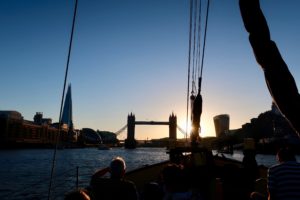 And towards the end of our voyage, the sun hung low as our sailing barge, the Lady Daphne, reduced speed and inched closer to Tower Bridge. Still in its usual configuration, the bridge impeded our passage. But we didn’t have to wait long before our passage was granted; the traffic of the aggressive city was suddenly forced to pause. The bridge lifted its bascule arms, and we passengers, without reflecting, shuffled to the bow to gain a closer look. The landscape as we sailed upon and under the bridge was cinematic. Everything drew upward in slow motion, framed by the slanting steel spanners that contrasted a pastel sunset sky with HMS BELFAST, the Shard, BT Tower and the Tower of London all jockeying for attention.
And towards the end of our voyage, the sun hung low as our sailing barge, the Lady Daphne, reduced speed and inched closer to Tower Bridge. Still in its usual configuration, the bridge impeded our passage. But we didn’t have to wait long before our passage was granted; the traffic of the aggressive city was suddenly forced to pause. The bridge lifted its bascule arms, and we passengers, without reflecting, shuffled to the bow to gain a closer look. The landscape as we sailed upon and under the bridge was cinematic. Everything drew upward in slow motion, framed by the slanting steel spanners that contrasted a pastel sunset sky with HMS BELFAST, the Shard, BT Tower and the Tower of London all jockeying for attention.
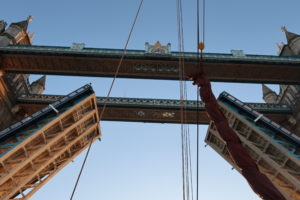 It was one of those fleeting moments that made you feel grateful to be alive.
It was one of those fleeting moments that made you feel grateful to be alive.
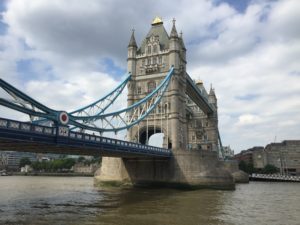 And as I now write this, today marks the 4thof July. It’s a non-event here in London, unless you count the England’s collective celebration after a shootout World Cup victory over Colombia last night. But I am no longer following the World Cup as closely—at least not at the moment. Today I’m just a bit homesick, and I’m keen to find a place that might provide me with some sort of tie to home.
And as I now write this, today marks the 4thof July. It’s a non-event here in London, unless you count the England’s collective celebration after a shootout World Cup victory over Colombia last night. But I am no longer following the World Cup as closely—at least not at the moment. Today I’m just a bit homesick, and I’m keen to find a place that might provide me with some sort of tie to home.
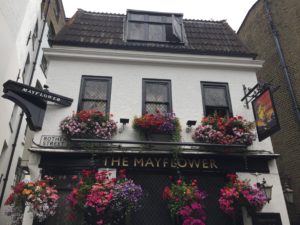 About a mile east of Tower Bridge on the southern bank lies a pub bearing the name of The Mayflower. I didn’t even notice it while on my sunset river journey; much like the skyscrapers bearing fantastic monikers and the Tower Bridge itself, the pub is one of many charming public establishments that are interesting in its own right.
About a mile east of Tower Bridge on the southern bank lies a pub bearing the name of The Mayflower. I didn’t even notice it while on my sunset river journey; much like the skyscrapers bearing fantastic monikers and the Tower Bridge itself, the pub is one of many charming public establishments that are interesting in its own right.
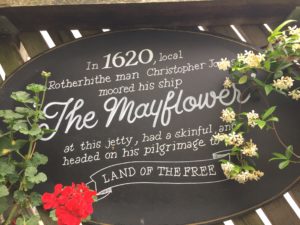 I don’t know if it’s true (but I’m not one to let the truth get in the way of a good story), but I felt like today would be a good day to visit The Mayflower because of historical association. The story is that back in 1620, a group of 60 people embarked The Mayflower ship near the pub’s site. The ship then transited the Thames, made several stops and taxing diversions before ultimately crossing the Atlantic and dropping its hook just off Provincetown Harbor. That’s the tip of Cape Cod. To me, it’s also home.
I don’t know if it’s true (but I’m not one to let the truth get in the way of a good story), but I felt like today would be a good day to visit The Mayflower because of historical association. The story is that back in 1620, a group of 60 people embarked The Mayflower ship near the pub’s site. The ship then transited the Thames, made several stops and taxing diversions before ultimately crossing the Atlantic and dropping its hook just off Provincetown Harbor. That’s the tip of Cape Cod. To me, it’s also home.
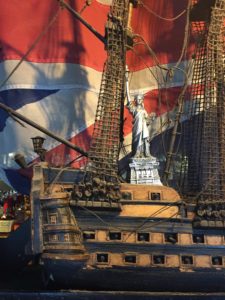 I’d be lying if I said that I saw nothing wrong with aspects of what currently makes headlines in my country. It’s instead a sentiment that defies words. We’ve evolved to a program of function where we do or don’t allow people on our shores based on the spikey, oversized signature that is scored across fancy cardstock. And then held up for all to see. But despite what my personal feelings might be about this process of dealing with modern day Puritans, there is still so much about my country that meets my approval.
I’d be lying if I said that I saw nothing wrong with aspects of what currently makes headlines in my country. It’s instead a sentiment that defies words. We’ve evolved to a program of function where we do or don’t allow people on our shores based on the spikey, oversized signature that is scored across fancy cardstock. And then held up for all to see. But despite what my personal feelings might be about this process of dealing with modern day Puritans, there is still so much about my country that meets my approval.
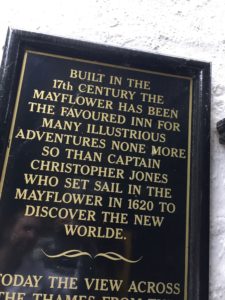 On days like today, I prefer to stop and remember moments that I value while drawing associations with my country and its international neighbors. I think about the ties that were forged here on the Thames and even those that are currently berthed in the French town of Rochefort. I think about later ships that sailed from England and wound up in New England—to include the ones where boxes of tea were mysteriously jettisoned into Boston Harbor to mark the rumblings of change. The modern-day conflicts that I juxtapose are not new, and they are instead sewn into to a larger sail of history that is constantly doing battle with the wind that it encounters.
On days like today, I prefer to stop and remember moments that I value while drawing associations with my country and its international neighbors. I think about the ties that were forged here on the Thames and even those that are currently berthed in the French town of Rochefort. I think about later ships that sailed from England and wound up in New England—to include the ones where boxes of tea were mysteriously jettisoned into Boston Harbor to mark the rumblings of change. The modern-day conflicts that I juxtapose are not new, and they are instead sewn into to a larger sail of history that is constantly doing battle with the wind that it encounters.
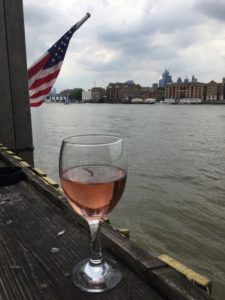 I’m thinking about all this stuff as I perch on The Mayflower’s jutting deck that provides a downward view of the Thames that splashes two meters below my wine glass. Maybe some 400 years ago the Pilgrim ship really did moor somewhere close to here. And now 400 years later, I got the chance to sail on these same waters and gain some feeling for what those first moments underway may have felt like four centuries ago. For sure the 17thcentury transit was difficult, but ultimately, they got close enough to where they were aiming to go.
I’m thinking about all this stuff as I perch on The Mayflower’s jutting deck that provides a downward view of the Thames that splashes two meters below my wine glass. Maybe some 400 years ago the Pilgrim ship really did moor somewhere close to here. And now 400 years later, I got the chance to sail on these same waters and gain some feeling for what those first moments underway may have felt like four centuries ago. For sure the 17thcentury transit was difficult, but ultimately, they got close enough to where they were aiming to go.
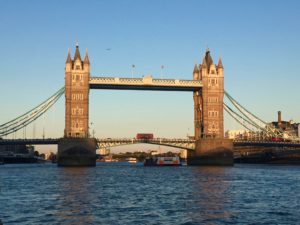 It would be nicely tied up if I could end this post at my last sentence—but I can’t help but mention that I have done nothing to speak of what the Wampanoag people might say about all of this. Indeed, I attempt no historical essay or even present a cogent treatise on what it means to be American. Our land is an ever-evolving and complicated tapestry. Call me overwhelmed by it all, and just craving simplicity—but today I just wanted to come back to the water, have a drink, and honor what I think are the best parts about our nation. And perhaps also to find my sense of place in a city that is not mine.
It would be nicely tied up if I could end this post at my last sentence—but I can’t help but mention that I have done nothing to speak of what the Wampanoag people might say about all of this. Indeed, I attempt no historical essay or even present a cogent treatise on what it means to be American. Our land is an ever-evolving and complicated tapestry. Call me overwhelmed by it all, and just craving simplicity—but today I just wanted to come back to the water, have a drink, and honor what I think are the best parts about our nation. And perhaps also to find my sense of place in a city that is not mine.
One of these days I’ll find myself in America for the Fourth of July. I’ll get to hear the household cannons fire and I’ll gaze at a sunset that falls over more familiar waters connected to the Atlantic Ocean. It’s a place that might not include the majestic Tower Bridge—but it does, in fact, offer a moving and mechanical marvel of its own. There’s the Railroad Bridge that spans Cape Cod Canal—just one of three bridges that brings fortunate people like me back to a place that I am so grateful to call home.